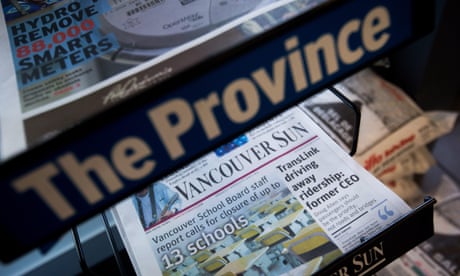Nearly two years ago, a journalism startup made bold promises to reshape community news in Canada, announcing plans to hire more than 200 journalists and open 50 new publications across the country.
But this month, as they culled nearly half the staff from their most successful publication, executives from the Overstory media group admitted that – despite the cascade of recent failures across the industry – they had thought turning a profit in local journalism would be “a lot simpler”. The job cuts have raised larger questions over the company’s future, and about that of alternative models of experimental journalism.
With legacy publications around the world in turmoil – just last month, Canada’s Postmedia Network Corp announced it would cut 11% of its editorial staff – a growing number of startups have emerged, all hopeful that they can find the right formula to reinvent journalism.

Last summer, Overstory solicited millions in investment capital to expand into small and mid-size North American cities. “These local markets are wide open and we intend to take them,” the company said in a pitch deck obtained by the Logic.
Since launching in 2021, however, the company has fallen far short of its ambitious expansion goals. With growth slowing in recent months, Overstory began cutting jobs. The deepest came in early February at Capital Daily, after the publication lost four of its employees, bringing its staff to three. The Victoria-based publication had repeatedly been held up as the company’s exemplar of an award-winning, profit-making publication.
Amid deteriorating finances, the outlet was also caught in a larger battle over the future of its operations, with executives weighing a shift to more frequent daily stories and staff pushing for longer, more time-consuming investigative articles.
“We know the daily newsletter is the most profitable part of the operation. And we were willing to play ball with this idea of shorter, quicker and more responsive pieces,” said Jimmy Thomson, the former managing editor of Capital Daily, who was among those fired. “But we also really felt that our community needs and values the longer stuff. And we really loved doing it.”
The layoffs quickly morphed into a broader public feud, after company cofounders posted a series of tweets seen as both naive about the journalism industry and dismissive of their employees.
Cofounder Andrew Wilkinson tweeted the executives were “guilty of being overly optimistic” in their goals.
“Not fun. News is hard,” he wrote.
The Overstory CEO, Farhan Mohamed, prompted indignation when he tweeted: “Many journalists don’t understand business. But worse? They don’t care to.” He later apologized to staff for his remarks.
But employees pushed back, saying the cuts left them “blindsided” and confused over the direction of the company, according to audio from a 6 February meeting.
Mohamed, who previously ran the news and entertainment media outlet Daily Hive, told staff the past weeks have been among the worst in his career.
“Maybe we underestimated this business and how hard it actually is. I thought it would be easier, thought it was going to be a lot simpler than it actually turned out to be,” Mohamed told staff, according to the recording. “We made some big bets, and a lot of them haven’t paid off.”
The firings in early February came a day before Overstory staff announced they were unionizing, but those involved in the efforts don’t believe the events are linked.
As it tried to quickly expand across the country, Overstory faced growth challenges, including questions over recruitment efforts.
Gabrielle Drolet, a Montreal-based freelance writer, said she spoke with Mohamed two years ago, hoping for an internship at Overstory. Instead, he suggested she run a publication.
“I had never been in a newsroom before. I didn’t have much editing experience … I could not believe it was happening.”
Drolet turned down the offer.
“It’s frustrating to see people who don’t know much about journalism assume that the industry is failing because of journalists, and not because of wider issues,” she said.
In a separate row, journalists and senior staff at the Ontario-based Queen’s Park Briefing resigned last week over allegations of editorial interference by company owners.
Days later, other reporters were also laid off.
But the cuts at Overstory have also raised broader questions about the company’s model, which aimed to rapidly turn a profit in an industry where publications struggle to survive.
Emma Gilchrist, editor in chief and cofounder of the environmentally focused publication the Narwhal, said pursuing nonprofit status made sense when she and colleague Carol Linnitt launched in 2018.
“When we started, we looked around and saw that other outlets were all operating as for-profit entities – but they weren’t making any profit. They were technically for profit, but they’re operating like a nonprofit without any of the benefits of being a nonprofit,’ she said.
The approach has paid off, with more than 6,000 readers contributing in 2022, enough to expand.
“People come to us to find stories they can’t find anywhere else,” Gilchrist said. “You need to have an audience and you need to have a growing audience. They need to be loyal and they need to be coming back.”
Other newly launched outlets have taken the nonprofit route, including the Investigative Journalism Foundation, which styles itself as the “future of Canadian journalism”.
Wilkinson, the Overstory cofounder, tweeted that he had lost C$5m (US$3.75m) of his own money in the venture, adding that nonprofit status “doesn’t mean you can lose money endlessly without cutting costs”.
Amid the tumult, former and current staff have also expressed concern about the future of the brand.
“There’s an opportunity here for Overstory. But they need to meet us in good faith and be a part of this solution together,” said Martin Bauman, a spokesperson for the Overstory media guild and a reporter at the Coast, which is owned by Overstory.
“We still believe in the vision of community news. We want to see they still do too. At this point, we’re looking for actions, not words.”
























